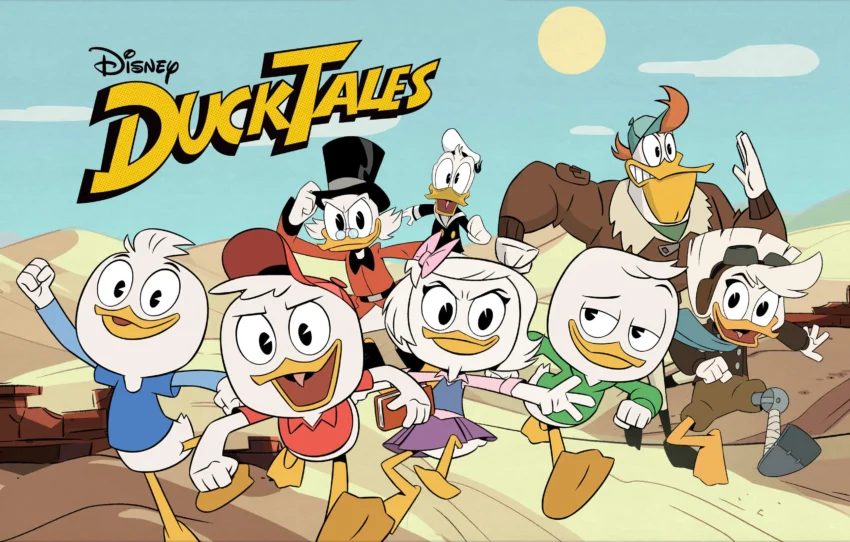If you’re like me, you tend to struggle with incorporating humor in novels that are meant to be serious.
Your story takes your protagonist to her limit. You find the two things she cares for most, and make her pick one. You watch her struggle through the painful process of rooting out a flaw that runs almost as deep as her morals while she continues to make the hard choices and suffer from the effects of making the easy ones. She cries out in agony, desperately wishing that she could be someone — anyone — else.
And then… you remember that your readers are also supposed to laugh.
How can they? Is a laugh really all that important? If your readers truly care for your protagonist, how could they laugh, anyway? Wouldn’t a laugh only cheapen the struggles your protagonist experiences?
To answer these questions, I would like to use Disney’s 2017-2020 series of DuckTales as an example not only of how powerful humor can be, but also how to implement it well.
Is Humor All That Important?
DuckTales is a three-season adventure series about a family of cartoon ducks. The series has a strong, unifying theme and characters that have real flaws, desires, and fears — many of whom change drastically over the series. Despite the fact that it is a kid’s show, it absolutely nailed many of the aspects of a good story that so many shows aimed at adults miss.
One of the reasons this series is so enjoyable is because it appeals to such a broad spectrum of ages. It is amusing enough that adults can enjoy it while also becoming invested in the story for its strong characters and high stakes. Despite its lighthearted tone, viewers are still deeply invested in its characters and theme. DuckTales used humor to touch nearly every demographic.
Humor is often difficult. It is so much easier to write an entire novel, a whole series even, without a single drop of comedy. Besides, I’m sure you can name at least half a dozen of your favorite books without a single humorous situation in any of them. It’s absolutely true that you could write a fine book without humor. But when you do that, you miss out on something big. There’s a connection that forms between people who genuinely laugh together that is different from any other kind of experience. If you want to make your book and characters as relatable as possible, it’s important that you utilize every tool in your toolbox to draw your readers in.
But there’s something bigger than relatability that humor does for authors. Think about the last time someone used humor to get a point across. You can likely clearly recall their point, and it seems both relatable and achievable. In the same way, the theme in your writing, when delivered with humor, is more likely to seem close to home for your readers, as well as a goal or value that they can and should strive for. If you want your readers to genuinely care about your theme, incorporating it into a story filled with little humorous moments is a great way to do that.
Aside from all of this, a book completely devoid of humor can often feel oppressive. Although your audience may be the kind that finds their favorite kind of literature set in dark worlds with few characters who are truly good and where light is nearly completely enveloped in darkness, they also need a break.
And you don’t have to compromise on the tone of your book by granting that kind of a break.
This is possible by using what I call the Humor Through Character method, as shown by the series DuckTales.
Humor Through Character
One of the many ways that DuckTales used this type of humor is through Dewey and Louie Duck’s relationship.
They are exact opposites in every area except one: they both suffer from an overconfidence that can lead to arrogance.
All Dewey wants is adventure and excitement, even if it gains him little more than the thrill of knowing he did something that truly matters. He’s willing to risk everything for what he loves, because it appeals to his thirst for adventure. He’s overconfident that he can conquer anything, no matter the danger or risk.
Meanwhile, all Louie wants is instant fame and fortune without having to contribute any sort of effort. If he could be anything, he would be an unusually well-fed cat, waited on hand and foot by his friends and family. He struggles to do the hard things that face him for the benefit of others because they directly contradict his one desire — ease. He’s overconfident that his desires are perfectly natural and that if he has a flaw, it isn’t worth changing.
They both think the other’s goals and desires are complete nonsense. Dewey finds fame and fortune empty, while Louie finds any effort without reward a waste of time. And both of them are willing to mock the other over it mercilessly.
The directors took these two characters and made them share a bunk bed.
You can see how this would lead to some pretty humorous situations.
When you have two characters that are direct opposites and you drive them into a situation when they must confront those characteristics, it not only opens up an opportunity to demonstrate their main drive (desire, goal, and fear) to your readers, but it also allows you some humor without compromising the height of your stakes or the necessity of your protagonist’s success.
On the other hand, if you were to incorporate humor into your villain, the importance of your stakes, or the necessity for your protagonist’s success, your readers will come away feeling as though your villain can’t be all that evil, the stakes can’t be all that high, and if your protagonist fails, they, as a mere reader, can just pick up a different book. Many of today’s children’s stories attempt to lighten their tone by having a hilarious villain or making the character’s stakes amusing. But lightening these aspects of the story makes these stories cheap and forgettable.
On the other hand, pitting your characters against each other in a humorous way touches all genres, because good stories are built on a protagonist and his relationships with other characters. In this way, even your darkest fantasy or your highest-tension action novel can include humor, because characters can still interact and conflict without compromising your tone.
Humor is an incredibly powerful tool. Used well, it can connect readers to your characters, even if your work isn’t inherently humorous. It gives your readers a much-deserved emotional break and also connects them to your characters through a strong emotion: joy. It’s a wonderful opportunity that simply should not be passed up.



What do you think about incorporating humor? What other places have you seen the Humor Through Character Method? And how was the article? Too sweet? Too sour? Just right? Comment below and let us know!


Hi! My name is Mara, and I’m a Christian artist, violinist, and blogger. I remember the day that I decided that I would learn something new about what makes a good story from every book I picked up — whether it was good, bad, or a mixture of both. I use this blog as a way of sharing some of the tips and tricks I’ve learned, and highlight which books, cartoons, and movies have taught me the most about writing an awesome story.

